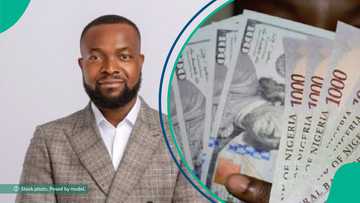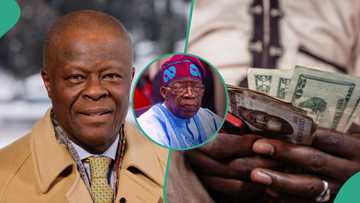Report Predicts Drop in Inflation, New Exchange Rate by Year End
- According to a recent analysis by Norrenberger, Nigeria's inflation is predicted to decline by the end of 2024
- According to the company's projections, the exchange rate will be N1,100 to $1 in the best-case
- A lack of infrastructure, high energy costs, among other factors are the main drivers of inflation
Do not miss an opportunity to join FREE webinar by Legit.ng. AI in Action: Practical Skills for Creative Professionals. Register here!
Norrenberger Group, a financial services company has projected that as efforts by both monetary and fiscal authorities strengthen, Nigeria's inflation is expected to drop by the end of 2024.

Source: Getty Images
In addition, it projected a 3.1% GDP growth rate in its Norrenberger Economic Outlook (NEO), titled "Nigeria: Beyond the Reforms."
According to Pabina Yinkere, Business Head of Norrenberger Assets Management, who presented the report, the country's inflation problem is still very real.
Infering from the report, Yinkere stated that the main causes of inflation are COVID-19, the conflict between Russia and Ukraine, a lack of infrastructure, high energy costs, unequal purchasing power, and the elimination of fuel subsidies.
PAY ATTENTION: Legit.ng Needs Your Help! Take our Survey Now and See Improvements at LEGIT.NG Tomorrow
“Subsequently, we have projected that inflation will moderate at 32.26 per cent at the end of the year while GDP growth is projected to moderate at 3.1 per cent.”
Additionally, the company projected that in the worst case event, the exchange rate will be N2,000 to $1, and in the best situation, N1,100 to $1.
The worst-case scenario, it stated, could brought about by rising global tensions, additional electricity tariff increases, a decline in crude oil production below 1.2 million barrels per day, and Dovish CBN policy, according to the report.
On the other hand, it stated that the best-case scenario, however, could be if oil production exceeds 1.5 million barrels per day and Dangote Refinery fully operates, as this will increase supply and improve economic activity.
More on the report
The report also pointed out that those who contributed the most to the economy were also the most negatively impacted by rising interest rates and unstable currency rates.
It highlighted that the largest sector are the ones with the biggest shock to the interest rate and exchange rate changes in the face of high inflation driven by food shortages.
The fallouts of the reforms by the current administration are; high prices, insecurity, increased poverty, depreciating currencies, high cases of divestment.
On the flip side, the reforms have also led to improved trade balance, increased FAAC allocation, surge in capital imported, increased foreign exchange and exchange rate convergence.
Tony Edeh, CEO of Norrenberger, stated that the forecast was combined with a panel discussion of seasoned financial specialists to exchange viewpoints and discuss current issues in order to offer specific suggestions for economic development and progress.
Speaking on factors driving inflation, Charles Abuede, a financial analyst said,
"Additionally, challenges in accessing foreign exchange (FX) in the foreign exchange market, coupled with inconsistent FX policies, compel these firms to increase prices, creating a mismatch with consumers' affordability."
Analysts give simple conditions to ending FX challenges
Legit.ng reported that Goldman Sachs experts claimed that Nigeria's inflation was being exacerbated by the naira's ongoing depreciation.
The experts are pushing for more than a 100 basis point increase in interest rates by the Monetary Policy Committee.
According to a Bloomberg article, the largest economy in Africa has seen little to no reduction in inflation, and the MPC would need to make a sizable rate change to significantly affect inflation.
PAY ATTENTION: Сheck out news that is picked exactly for YOU ➡️ find the “Recommended for you” block on the home page and enjoy!
Source: Legit.ng




